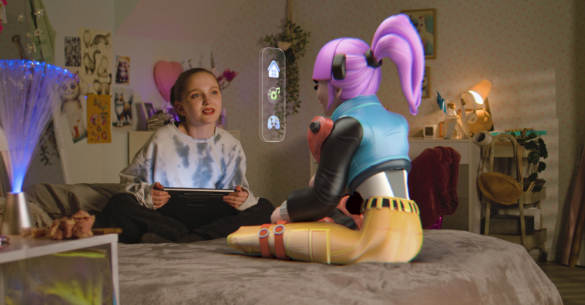AI Chatbots - Is your child chatting to a real friend - or an AI chatbot?

AI chatbots and companion apps are popular among children who experience both benefits and risks.
See how you can help them navigate this technology safely.

Quick tips
Help children manage their interaction with AI chatbots and companion apps with these quick tips.
Set clear boundaries
Agree on limits around when and how your child can use AI chatbots such as only chatting in common areas.
Talk regularly
Discuss their experiences, including positive and negatives, and ask them to show you how to use these apps.
Teach critical thinking
Encourage children to question what AI chatbots tell them and to use caution in these virtual interactions.
What to know about AI chatbots
AI chatbots and companions make up a common part of children’s digital experiences. They offer interactive conversations, learning opportunities and entertainment in different forms.
While many children find these virtual friends fun and engaging, they also pose potential risks. Such risks include privacy concerns, misinformation and emotional attachment.
This guide will help parents understand the most popular AI companion apps, the risks involved, and how to support children in using them safely and responsibly.
Risks of using AI chatbots
While AI companions and chatbots can offer many positive benefits, they also present potential risks. Here are key concerns to consider:
- Privacy risks: AI chatbots often collect and store user data. Ensure children are not sharing personal information.
- Inappropriate content: Some AI chatbots may generate responses that are not suitable for children. Even with filters, unpredictable interactions can occur.
- Emotional attachment: Children may develop strong emotional connections with AI companions, which could impact real-life social interactions and emotional wellbeing.
- Misinformation: AI-generated responses may not always be factually accurate. Children need guidance to critically assess the information provided.
- Potential for exploitation: Some AI platforms have paid features or in-app purchases, and some may use persuasive tactics to encourage extended engagement.
What are AI companions?
AI companions are chatbots and virtual characters powered by artificial intelligence. They engage users in conversations and often provide companionship. In some cases, these companions also offer advice or emotional support. One such platform is Character AI, which has faced various controversies.
Popular AI companion apps targeted at young people
- Replika: An AI chatbot designed to offer companionship and emotional support. However, but its open-ended nature may not always be child-appropriate.
- My AI: An AI chatbot built-in to Snapchat that answers questions and interacts with users in a conversational style.
- Character.AI: An app which lets users create and chat with AI-generated personalities, including fictional characters and celebrities.
- Kajiwoto: A platform where users can create and train their own AI companions and chatbots.
- Gemini / ChatGPT: While designed for general inquiries, children often use them for entertainment, learning and casual conversation.
- AI Dungeon: An interactive storytelling game that uses AI to generate text-based adventures.
- Talkie: A platform which allows users to interact with AI-powered characters and voice-based AI companions and chatbots.
How to support children’s safe use of AI chatbots
Check age ratings and set parental controls
If your child wants to use an AI chatbot, check that they meet minimum age requirements. You can minimise access to age-inappropriate apps by setting parental controls.
Discuss privacy and safety
AI chatbots learn from what users share with it, including private and personal information like addresses and phone numbers.
Discuss what privacy means and encourage children to report responses that are incorrect, that spread hate or that otherwise make them feel uncomfortable.
Use AI chatbots together
Just like any other app, exploring AI chatbots and companion apps with your child can help you better understand the platform.
Familiarise yourself with the different settings and risks, and discover different ways that you can have fun together.
Talk about real vs. AI relationships
Some children might feel a very real connection to their AI chatbot and it’s important to understand why and how it supports them. But it’s also important to remind them that their companion is AI and cannot replace relationships with real people.
Create an agreement around AI use
Establish clear rules about when your whole family can use AI chatbots, including for how long. Talking about appropriate use is important too. You might also want to designate common areas in the home to minimise risk of harm.
